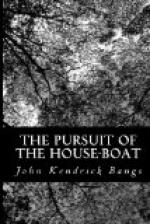“You can if you want to, but it is better not to,” rejoined Holmes, simply, as though not observing the sneer, “because the ripple represents the outer lines of the angle of disturbance in the water; and as any one of the sides to an angle is greater than the perpendicular from the hypothenuse to the apex, you’d merely be going the long way. This is especially important when you consider the formation of the bow of the House-boat, which is rounded like the stern of most vessels, and comes near to making a pair of ripples at an angle of ninety degrees.”
“Then,” observed Sir Walter, with a sigh of disappointment, “we must change our course and sail for Paris?”
“I am afraid so,” said Holmes; “but of course it’s by no means certain as yet. I think if Columbus would go up into the mizzentop and look about him, he might discover something either in confirmation or refutation of the theory.”
“He couldn’t discover anything,” put in Pinzon. “He never did.”
“Well, I like that!” retorted Columbus. “I’d like to know who discovered America.”
“So should I,” observed Leif Ericson, with a wink at Vespucci.
“Tut!” retorted Columbus. “I did it, and the world knows it, whether you claim it or not.”
“Yes, just as Noah discovered Ararat,” replied Pinzon. “You sat upon the deck until we ran plumb into an island, after floating about for three months, and then you couldn’t tell it from a continent, even when you had it right before your eyes. Noah might just as well have told his family that he discovered a roof garden as for you to go back to Spain telling ’em all that San Salvador was the United States.”
“Well, I don’t care,” said Columbus, with a short laugh. “I’m the one they celebrate, so what’s the odds? I’d rather stay down here in the smoking-room enjoying a small game, anyhow, than climb up that mast and strain my eyes for ten or a dozen hours looking for evidence to prove or disprove the correctness of another man’s theory. I wouldn’t know evidence when I saw it, anyhow. Send Judge Blackstone.”
“I draw the line at the mizzentop,” observed Blackstone. “The dignity of the bench must and shall be preserved, and I’ll never consent to climb up that rigging, getting pitch and paint on my ermine, no matter who asks me to go.”
[Illustration: JUDGE BLACKSTONE REFUSES TO CLIMB TO THE MIZZENTOP]
“Whomsoever I tell to go, shall go,” put in Holmes, firmly. “I am commander of this ship. It will pay you to remember that, Judge Blackstone.”
“And I am the Court of Appeals,” retorted Blackstone, hotly. “Bear that in mind, captain, when you try to send me up. I’ll issue a writ of habeas corpus on my own body, and commit you for contempt.”
“There’s no use of sending the Judge, anyhow,” said Raleigh, fearing by the glitter that came into the eye of the commander that trouble might ensue unless pacificatory measures were resorted to. “He’s accustomed to weighing everything carefully, and cannot be rushed into a decision. If he saw any evidence, he’d have to sit on it a week before reaching a conclusion. What we need here more than anything else is an expert seaman, a lookout, and I nominate Shem. He has sailed under his father, and I have it on good authority that he is a nautical expert.”




